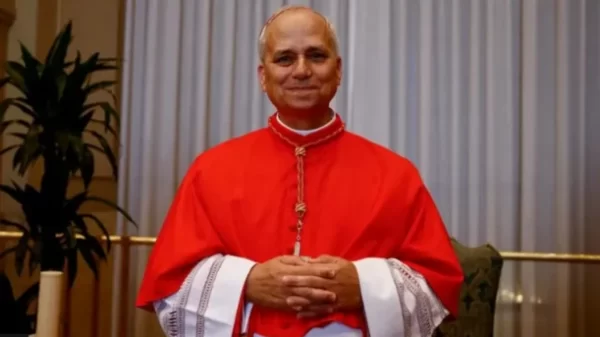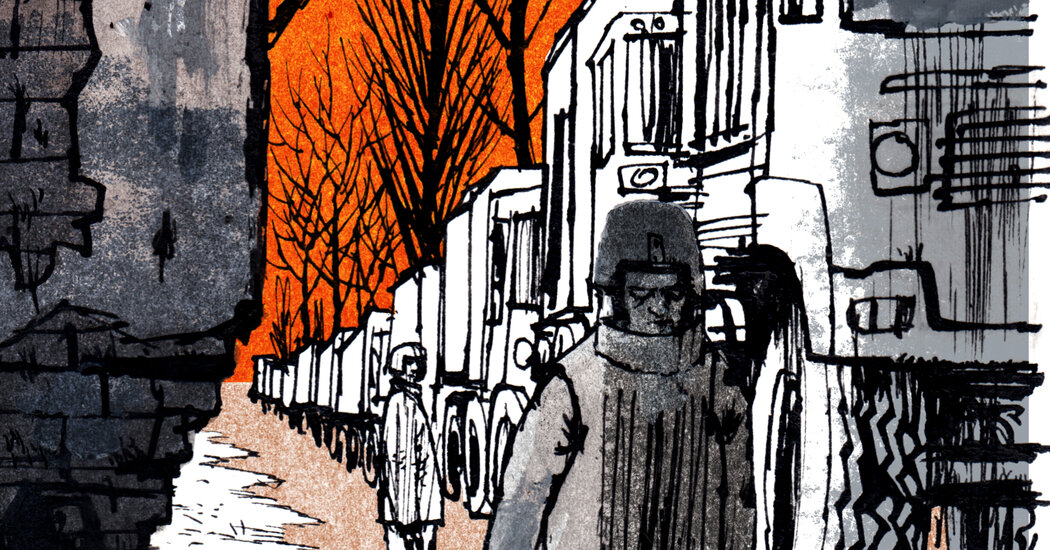My 70-year-old aunt had planned a quiet week. A bit of ironing, planting petunias in the garden and maybe finally tackling an unwieldy tangle of electrical chargers. Instead, she sits with my uncle, watching the Russian invasion on their laptops.
I’d felt a very familiar sense of dread as Vladimir Putin, the president of Russia, massed troops on the border of Ukraine. But as Russia’s invasion began early on Thursday under the pretext of rescuing the eastern region of Donbas from Ukraine’s military aggression, I knew: My family has never asked to be rescued by Russia. For eight years this conflict has done nothing for my family except tear it apart. This is just the latest ugly chapter.
I emigrated to San Francisco from Moscow as a teenager in 1996, but most of my family still live in Russia and Ukraine. My father, who grew up in Donetsk, moved to Moscow in the 1970s and lived there until his death in 2017. My brother still lives in Moscow. Until 2014 the rest of my family — my grandmother, aunt, uncle, cousins and nephews — all lived in Donetsk, and I visited them almost every summer since I was little.
The Donetsk of those visits always felt like a refuge. Located an hour and a half drive from the Russian border in Ukraine’s southeastern rust belt, it was a modernizing industrial city of about a million people that was somehow still quiet and welcoming. People spoke Russian with a Ukrainian accent, ate Ukrainian gray bread with frozen lard slices, and planted elaborate flower beds to liven up the Soviet-era squares, theaters and boulevards. My cousins would take me swimming in the Kalmius River or strolling past open-air cafes. Even now, the sound of doves takes me back to those warm afternoons.
In the spring of 2014, when fighting first broke out in Donetsk and the surrounding region between “separatists” backed by Russia and the government of Ukraine, it came as a shock not just to the outside world but also to many of the people who lived there. The separatists didn’t want to accept the new Ukrainian government and insisted that the Russian-speaking region of Donbas would be better off with the richer, more powerful Russia. But they did not speak for my family, or for many others in the Donbas.
My father’s side of the family has lived in Donetsk since the 1950s, never harboring any separatist feelings: They hosted Ukrainian and Russian relatives; they spoke Russian at home and on the street, but they enjoyed watching TV in Ukrainian; they found Ukraine’s politics dysfunctional and the pervasive corruption repulsive, but they thought the situation in Russia wasn’t much better. In short, they were fine where and as they were — they didn’t want to separate from Ukraine, just as they didn’t want to be a part of Russia.
But war came to them, and they found themselves at the center of an international standoff.
Back in 2014, my cousin Anna was the first person I knew who realized that this was going to turn into a long conflict. Many in my family tried to convince her that she was panicking for no reason, that the idea of a war between Russia and Ukraine was preposterous. She didn’t listen. She took her two young sons and fled. My other cousin, Mikhail, held on for a few more months, but when it was clear that his hobby store — selling model airplanes and tanks — would not survive, he also left. Who has time for toys when there are real tanks on the streets? They went to Kyiv and became part of the wave of internally displaced persons in Ukraine. Many Donbas residents also sought asylum in Russia, and a smaller number of people, who could, went to Poland and other European countries.
Unlike my cousins, our 90-year-old grandmother, who had survived the Nazi occupation of Ukraine, had no intention of leaving. When I called her from California to urge her to abandon the heavily shelled city, she told me: “Let them come and get me. I’m too old to leave.” Then she recited a dirty poem she’d made up about Mr. Putin.
My uncle and aunt stayed in Donetsk because of Grandma and because restarting their life elsewhere seemed too difficult.
In 2016, after several cease-fire agreements, I visited them with my brother for the first time in three years. Donetsk no longer felt like a refuge. It was boarded-up stores, empty apartments, broken windows and women with their hair no longer colored in salons that no longer existed. Bullet holes punctured everything — apartment buildings, newspaper kiosks, closed kebab stands. In downtown, a huge poster depicted a soldier holding an ecstatic child and the words “Happy Donbas Liberation Day!” (Somehow, I’d never realized that my family needed to be liberated.)
By then, my grandma had had a stroke and didn’t speak much, though, oddly, the little she did say was in Ukrainian. Years of war had left my aunt somewhere between traumatized and amused, a quintessentially Soviet attitude. “It’s terrible to realize how used to this war we’ve become,” she told us. “It isn’t right. It’s inhuman to feel this way.”
My aunt and uncle have never approved of the self-proclaimed separatist republic, but as many around them have accepted it, their circle has grown smaller, making them feel even more isolated and angry. Grandma passed away in 2019. Their children stayed in Kyiv. My aunt and uncle converted their basement into a bomb shelter, dug in and slowly got used to their strange life.
They got used to not receiving any mail or money from the outside world, because Donetsk had virtually no international post office or banks. They got used to not having an airport after the Donetsk International Airport, rebuilt and gleaming for the Euro 2012, was reduced to rubble. They got used to the long journey through checkpoints, on an unmarked minibus, to see their children in Kyiv, or the wait for their children to arrive in Donetsk through the same checkpoints. They got used to the daily rumble of the separatists’ army trucks driving past their house from the nearby base. They got used to the fact that the rest of the world had largely forgotten about them.
But then Mr. Putin ordered his military into Ukraine, and the regional conflict they lived with stoically for so long grew into an international calamity, and the last of my aunt’s composure evaporated. Now when I call her, she is in tears.
“I’m not afraid for my own life anymore after eight years of war,” she says. “But my heart aches for my children.”
My cousins Mikhail and Anna are in Kyiv waiting for the fallout of the second Russian invasion of their lives. They tell me their experience in Donetsk has made them less panicky than most Ukrainians who’ve never seen war. I can’t bring myself to tell them that my fear is that their whole country will be turned into Donetsk, an unlivable unplace.
I ask myself if I should have seen this coming, or insisted that they leave. Now all I can do is rush to the phone every morning to check in with them.
“There were times in the past few years that I felt like soon normal life will return,” my aunt told me on Friday, as Russian troops moved toward Kyiv. “But now I know it won’t.”
Sasha Vasilyuk (@sashavasilyuk) is working on a novel set in Ukraine.
The Times is committed to publishing a diversity of letters to the editor. We’d like to hear what you think about this or any of our articles. Here are some tips. And here’s our email: letters@nytimes.com.
Follow The New York Times Opinion section on Facebook, Twitter (@NYTopinion) and Instagram.




























